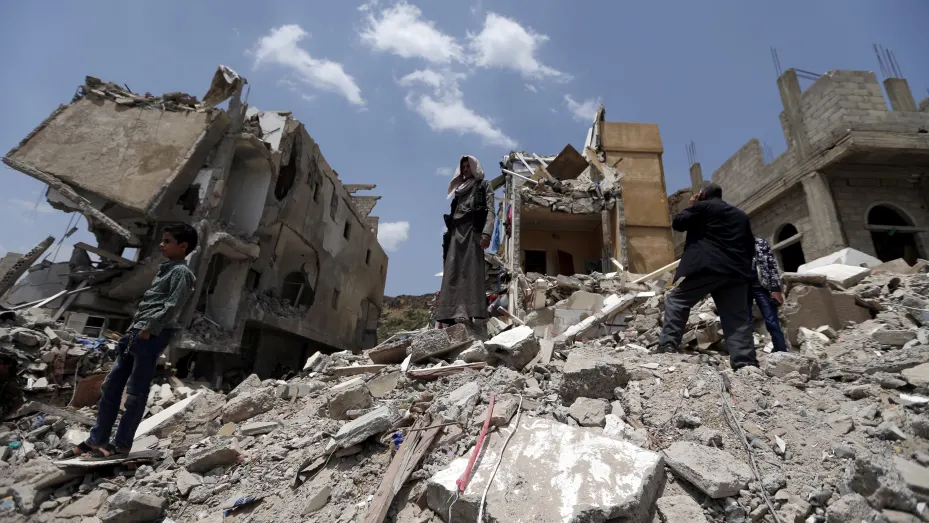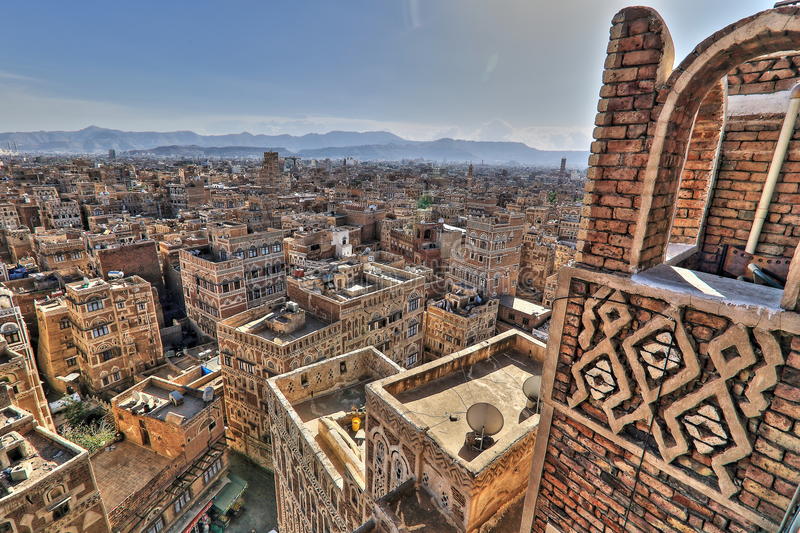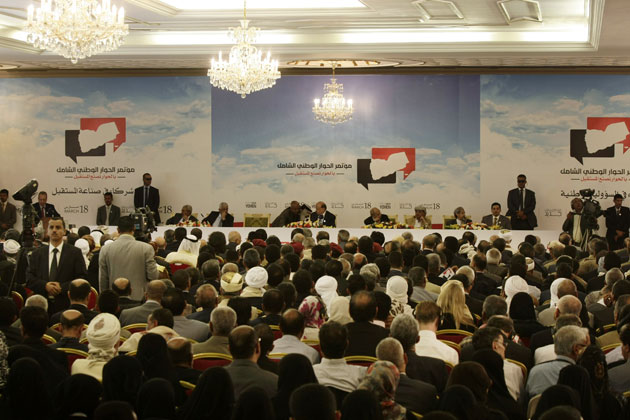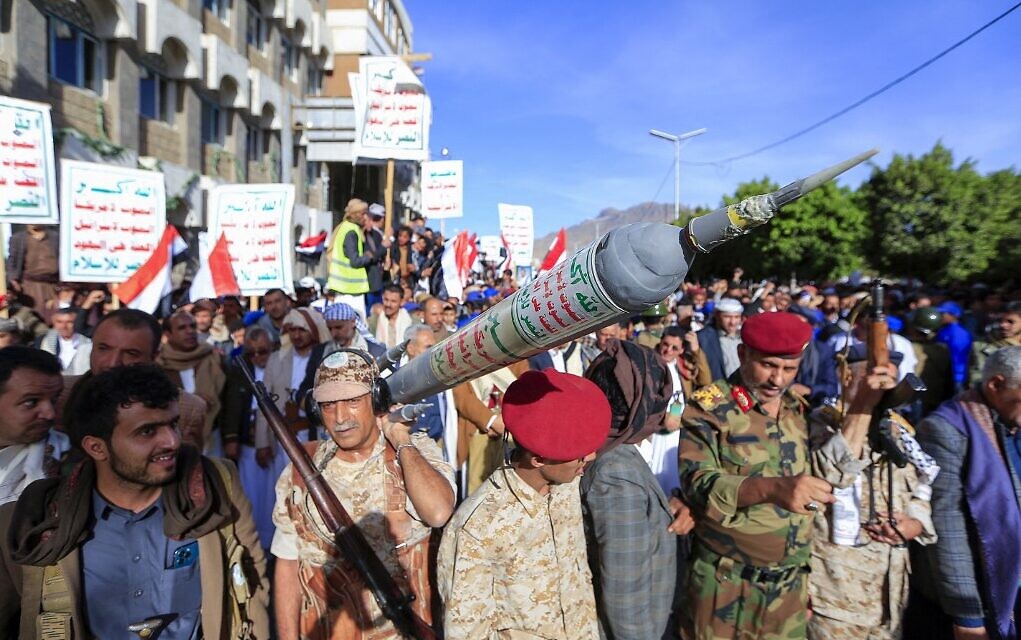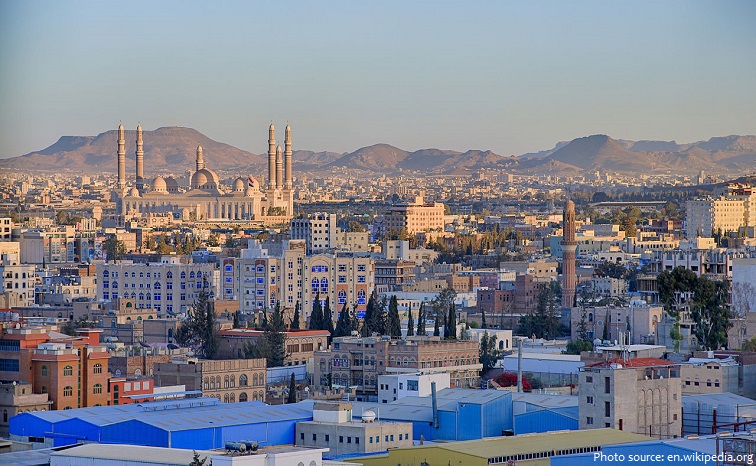2004-2010: Houthi Rebellion
Tensions between a mounting Houthi rebellion and the regime of President Ali Abdullah Saleh reached a tipping point in summer 2004, sparking six wars centered in and around the Houthi stronghold in Saada governorate along Yemen’s northern border with Saudi Arabia. At the end of the first war in September 2004, government forces led by General Ali Mohsen Al-Ahmar, the former vice president in the Hadi government, killed Hussein Badreddin al-Houthi, the founder of the rebel movement. In the sixth and final war from October 2009 to February 2010, the fighting spilled over into Saudi Arabia, prompting Saudi airstrikes. Around the same time, the first Iranian arms shipment to the Houthis was seized by the Yemeni government.
2011: Arab Spring Uprisings in Yemen
November 2011 – After nearly a year of youth-led peaceful protests calling for the end of the Saleh regime, the embattled president agrees to step down in exchange for immunity against past crimes, as part of a Gulf Cooperation Council (GCC)-brokered political deal.
February 2012 – Saleh’s deputy Abd Rabbo Mansour Hadi, is named president in an uncontested election for a two-year term. In line with the GCC deal, Hadi is tasked with carrying out a range of democratic reforms – including the restructuring of the armed forces and the drafting of a new constitution – culminating in national elections.
January 2014 – After 10 months of deliberations, the National Dialogue Conference (NDC), a centerpiece of the political transition aimed at addressing historical grievances, produces a series of outcome documents which are supposed to inform the new constitution. One of the NDC outcomes was the division of the republic into a federation of six regions.
September 22, 2014 – Houthi military forces storm Yemen’s capital, Sana’a and begin consolidating control with the help of allies of former President Saleh. The Houthis had been steadily advancing militarily from Saada to Sana’a throughout the political transition, despite participating in the NDC and signaling intentions to participate in the democratic process.
January 2015 – President Hadi resigns as president after Houthi forces place him under house arrest.
February-March 2015 – After Houthis consolidate control of government institutions in Sana’a, Hadi escapes house arrest and travels to the southern port city of Aden. He then declares Aden the interim capital, retracts his resignation and begins organizing a counteroffensive against the Houthis. Meanwhile, Houthi and Saleh forces expand aggressively outside of Sana’a, quickly reaching Yemen’s second and third-largest urban centers of Taiz and Aden. Hadi flees to Saudi Arabia’s capital Riyadh.
March 26, 2015: In response to requests from Hadi, Saudi Arabia forms a coalition of Arab states and launches Operation Decisive Storm, a military offensive aimed at rolling back the Houthi-Saleh advances and returning Hadi to power.
April 2015 – The UN Security Council passes resolution 2216 imposing an arms embargo on Iranian arms shipments to the Houthis. The embargo forms the legal basis for restrictions on imports through Houthi-controlled ports around the Red Sea city of Hodeida.
August 2015 – Houthi forces take control of most of Shabwah governorate in southeast Yemen.
April 2016 – The UN sponsors peace talks between Hadi’s internationally recognized government and the Houthi-Saleh alliance.
May 2017 – Weeks after Hadi fires Aden Governor Aydaroos Al-Zubaidi for prioritizing southern independence over a united Yemen, Al-Zubaidi announces the formation The Southern Transitional Council (STC). Established with the support of the UAE, the STC has become a powerful political and military force in southern governorates with the aim of reviving the former independent state of South Yemen.
December 2017 – Former President Saleh splits with the Houthis and signals a willingness to side with the Saudi-led coalition. The latter rebuffs the gesture and the Houthis kill Saleh, leading many of Saleh’s allies in his General People’s Congress (GPC) political party to sever ties with the group. Saleh’s nephew, Tariq Saleh, who commanded the country’s special forces, defects to the anti-Houthi coalition and eventually establishes a base in the Red Sea port city of Mokha.
January 2018 – The UAE-backed Southern Transitional Council (STC) attempts to wrest control of Aden from Hadi’s government.
April 2018 – A Saudi-led coalition drone strike kills Saleh Ali al-Sammad, president of Houthi’s Supreme Political Council, making him the most senior Houthi casualty since the coalition entered the war in 2015.
May 2018 – UAE forces take over the Yemeni island of Socotra in the Arabian Sea, creating a new source of tensions with the internationally recognized government.
June-July 2018 – UAE-backed forces along Yemen’s Red Sea coast lead an offensive to capture the Houthi-held port city of Hodeida.
October 2018 – Washington Post columnist Jamal Khashoggi is murdered by Saudi agents in Istanbul, adding to mounting criticism over US support for the Saudi-led coalition’s role in Yemen’s civil war.
December 2018 – Pressure continues to build in the US for the withdrawal of support for the Saudi-led coalition in Yemen. The US Senate votes to invoke the War Powers Resolution to force the US military to end its participation in the war. The internationally recognized government and the Houthis sign the Stockholm Agreement that includes prisoner swaps, a mutual redeployment of forces away from Hodeida ports, and a committee to discuss the city of Taiz besieged by Houthi forces since the start of the war.
January 2019 – Houthis launch a drone attack on Al-Anad Air Base north of Aden, injuring dozens and killing the head of Yemen's military intelligence service.
June 2019 – Following the unsuccessful military campaign to capture Hodeida ports, and in the face of mounting public criticism for its role in the war, the UAE announces the drawdown of its military forces in Yemen. Despite the significant reduction in UAE troops, some Emirati soldiers remain in Yemen and support for the STC and its military and security wings continues.
April 2019 – President Donald Trump vetoes a bipartisan congressional measure that would force the US military to end its role in the Yemen war.
August 2019 – The STC expels the internationally recognized government from Aden and establishes control of parts of Abyan.
September 2019 – The Houthis claim responsibility for a flurry of drone and missile attacks on Saudi Arabia’s Abqaiq and Khurais oil processing facilities. Western intelligence officials conclude that the attack emanated from Iran, due to the sophistication of the strikes.
November 2019 – In an effort to end infighting between the main Yemeni partners of the anti-Houthi coalition, Saudi Arabia brokers a power-sharing deal known as the Riyadh Agreement. The deal outlines military, security, economic and political reforms aimed at uniting the internationally recognized government and the STC.
January-February 2020 – Houthis kill more than 110 army soldiers in a missile strike on a mosque in western Marib governorate, reigniting fighting along the frontline between Marib and Sana’a.
March 2020 – Houthi forces capture Al-Hazm, the capital city of Al-Jawf governorate as the group continues its military expansion in and around Marib.
April 2020 – Major donors, UN agencies and other international NGOs decide at a summit in Brussels to suspend humanitarian aid in response to widespread Houthi diversion and obstruction of aid activities. Houthi authorities negotiate the resumption of aid work.
May 2020 – The STC pulls out of the Riyadh Agreement and declares self-rule in southern governorates.
Summer 2020 – In June, UAE-backed STC seizes control of Socotra island by force, expelling the internationally recognized government. In July, the STC abandons self-rule and returns to the Riyadh Agreement.
December 2020 – The STC and the Hadi government form a power-sharing cabinet in line with the Riyadh Agreement. Prime Minister Maeen Abdulmalik Saeed is reappointed as head of the Hadi government’s new cabinet. The new cabinet is targeted by Houthi missiles after arriving to Aden international airport from Saudi Arabia. Dozens of civilians are killed, but the ministers escape unscathed.
January 2021 – The Trump administration cites the December missile attacks to justify designating the Houthis as a foreign terrorist organization (FTO).
February 2021 – President Joe Biden announces changes to US policy toward Yemen, including revoking the Houthi FTO designation, declaring an end to US support for the Saudi-led coalition’s offensive operations in the conflict, appointing Timothy Lenderking as a special envoy for Yemen, supporting the UN-led peace process, and providing assurances to Saudi Arabia regarding the defense of its territory.
